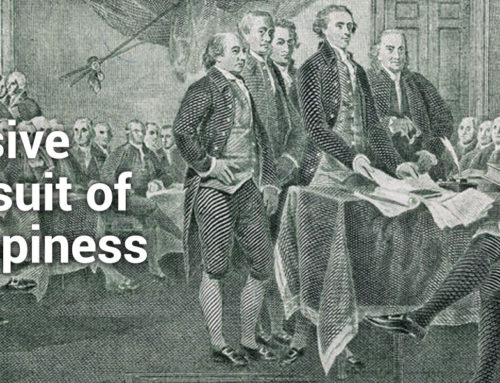Having written two books on organizational and team leadership*, I have come to realize that the principles used to create a successful business are the same principles you can use to create a successful life. In my leadership training and coaching, I make a point of telling participants “You have no business trying to lead anyone else until you have learned to lead yourself.” Leading oneself or Personal Leadership is the process of designing and then leading a happy and successful life based on your unique talents, strengths and aspirations. As you implement your blueprint, you will learn, grow and update your plans for the future as you gain experience and increased self-awareness. These are the same principles I have written about in my books which I have named The Performance Trilogy®.
I recognize that writing about and offering advice on leading a successful and happy life is a daunting task and open for lots of criticism and second guessing. That’s OK, I’m ready for it. I have spent the better part of my 71 years as a student and practitioner of the subject and am currently teaching two graduate leadership courses at Northeastern University. I have been accused of being a serial learner whose biggest passion is reading. After receiving my doctorate in science (Ph.D. in Bioanalytical Chemistry), I became a life-long learner studying history, philosophy (first western and then eastern), religion, psychology, business, economics, and literature. I was always fascinated by history’s leaders and how they changed the world. Of the thousands of books and articles I’ve read by leading experts in their field, I have been impressed and influenced by their depth of subject matter expertise and their take on leading the good life.
However, most all of the leading experts and teachers in the above subject areas (history, philosophy, religion, psychology, ect.) look at the concepts of success and happiness through the unique lenses of their respective professions. This has led to much controversy and apparent inconsistency in the theories of success and happiness. While there has been some good literature on the general subject of success and happiness in the past 100 years, I have been struck by the lack of integration of all this knowledge and wisdom into a practical formula for designing and achieving both success and happiness. This is particularly important not just for the elite, but for everyone interested in pursuing the good life.
In upcoming articles, it is my intention to present such a formula. Being trained as a scientist, I am comfortable in developing a hypothesis; analyzing mountains of data; synthesizing the data, rigorously testing it and developing a formula to explain it. The first challenge will be to come up with my universal definition of success as well as happiness. As you can well imagine, this is no easy feat given the enormous diversity of opinions and misconceptions there are about both concepts. I will attempt to provide such definitions and validate them based on my understanding gleaned from the diversity of experts throughout history.
With solid definitions in place, we can then present the formula for success and happiness. This formula will need to explain why there are so many people who are successful but not happy and why there are so many people who are not successful but still happy. It will also need to reconcile the differences between the two major philosophies: western philosophy that emphasizes achievement and eastern philosophy which emphasizes being. The formula will need to be robust; that is, list those thoughts and actions that result in both success and happiness as well as practical; that is, capable of being universally implemented and practiced.
Once we have presented and explained the formula, we can then proceed to use it as a guide to designing and leading a successful and happy life. This will require asking 7 very difficult but critically important questions. The questions are:
- Who am I?
- Where am I going and why?
- Who do I want to become and why?
- How do I get there?
- Who do I want to accompany me?
- How will I measure MY success?
- Will I be happy?
Personal leadership is the process of answering these seven questions, truthfully, without bias and without fear. We will explore each of these questions in great detail referencing leaders in their fields of endeavor throughout history and learning from their wisdom.
Lest you think that this is another academic treatise that doesn’t pertain to the “common man”, my story will convince you otherwise. I grew up as a street kid in Boston’s North End from parents with a third-grade education. My father emphasized achievement and my mother provided unconditional love. I will be confessing to you how I have personally answered these questions throughout my life and the decisions I have made (both good and bad) as a result so as to pass on the lessons I have learned. My story and unique anecdotes and examples will serve to reinforce the principles presented.
It is my intention to present this material in bite size portions, collect the articles, and then publish them in my monthly newsletter. If you wish to be sure not to miss any of the articles that appear in social media, sign up for my newsletter here and invite your friends and colleagues to do the same. The newsletter is free and I won’t ask you to buy anything. I would ask however that you participate in the development of this body of work by commenting (agreeing or disagreeing) on each of the articles with your own analysis in an attempt to get at a more thorough truth not just my opinion. Finally, feel free to include your story and advice as a way of passing on the lessons you have learned about success and happiness at this point in your life. I very much look forward to our conversation.
*Leading Science and Technology Organizations: Mastering the Fundamentals of Personal, Managerial, and Executive Leadership
*On Becoming a Three-Dimensional Leader



Leave A Comment